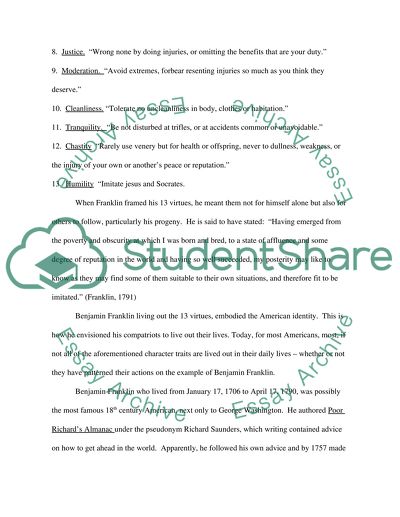Cite this document
(Revealing Picture of Franklin Case Study Example | Topics and Well Written Essays - 2250 words, n.d.)
Revealing Picture of Franklin Case Study Example | Topics and Well Written Essays - 2250 words. Retrieved from https://studentshare.org/history/1541461-this-is-for-an-intro-to-american-lit-class-my-topic-is-how-does-benjamin-franklins-autobiography-begin-to-articulate-a-distinctively-american-conception-of
Revealing Picture of Franklin Case Study Example | Topics and Well Written Essays - 2250 words. Retrieved from https://studentshare.org/history/1541461-this-is-for-an-intro-to-american-lit-class-my-topic-is-how-does-benjamin-franklins-autobiography-begin-to-articulate-a-distinctively-american-conception-of
(Revealing Picture of Franklin Case Study Example | Topics and Well Written Essays - 2250 Words)
Revealing Picture of Franklin Case Study Example | Topics and Well Written Essays - 2250 Words. https://studentshare.org/history/1541461-this-is-for-an-intro-to-american-lit-class-my-topic-is-how-does-benjamin-franklins-autobiography-begin-to-articulate-a-distinctively-american-conception-of.
Revealing Picture of Franklin Case Study Example | Topics and Well Written Essays - 2250 Words. https://studentshare.org/history/1541461-this-is-for-an-intro-to-american-lit-class-my-topic-is-how-does-benjamin-franklins-autobiography-begin-to-articulate-a-distinctively-american-conception-of.
“Revealing Picture of Franklin Case Study Example | Topics and Well Written Essays - 2250 Words”. https://studentshare.org/history/1541461-this-is-for-an-intro-to-american-lit-class-my-topic-is-how-does-benjamin-franklins-autobiography-begin-to-articulate-a-distinctively-american-conception-of.


